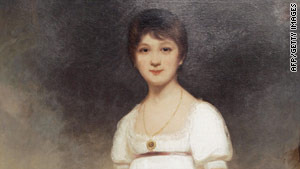Michelle Moran's Blog, page 114
December 4, 2009
Student finds letter 'a link to Jefferson'
(CNN) -- In a nondescript conference room tucked inside the library at the University of Delaware, a graduate student found a historian's equivalent to a needle in a haystack.
Read the rest on CNN.December 3, 2009
Rome unveils ancient luxury complex
ROME — Italian officials unveiled new discoveries Thursday in an ancient Roman luxury complex filled with priceless mosaics, elegant porticos and thermal baths.
Read the rest from the AP.
Panel Criticizes Military's Use of Embedded Anthropologists
A two-year-old Pentagon program that assigns social scientists to work with military units in Iraq and Afghanistan has come under sharp criticism from a panel of anthropologists who argue that the undertaking is dangerous, unethical and unscholarly.
Read the rest on the NYT.
Bad Teeth Tormented Ancient Egyptians
Worn teeth, periodontal diseases, abscesses and cavities tormented the ancient Egyptians, according to the first systematic review of all studies performed on Egyptian mummies in the past 30 years.
Read the rest on Discovery.
December 2, 2009
What really killed Jane Austen?
 This work by British painter Ozias Humphry is the only known oil painting of Jane Austen, believed to be aged about 14.
This work by British painter Ozias Humphry is the only known oil painting of Jane Austen, believed to be aged about 14.By Richard Allen Greene
London, England (CNN) -- It is a truth universally acknowledged -- or nearly so -- that Jane Austen, the author of "Pride and Prejudice," died of a rare illness called Addison's disease, which robs the body of the ability to make critical hormones.
Katherine White doesn't believe it.
Porpoise porridge, sir? World's oldest recipe book reveals dishes English kings enjoyed 600 years ago
Dishes of chicken blancmange and porpoise porridge are unlikely to whet the appetite of most modern food lovers. But such recipes were apparently fit for a king 600 years ago. Written by chefs employed by Richard II, they are included in what is thought to be the world's oldest cookbook.

A meal fit for a king? Visitors to Manchester University's John Rylands library are tasting meals cooked from the world's first cookbook written in 1390
Read the rest on the Daily Mail.
How a prehistoric 'super river' turned Britain into an island nation
A prehistoric 'super-river' is the reason why Britain became an island and was cut off from Europe. An Anglo-French study has revealed that long before the English Channel there was a giant river which ran south from an area of the North Sea.
Read the rest on the Daily Mail.
Remains of Roman tower discovered during City Walls repair project in Chester
THE well-preserved remains of a Roman tower used by guards patrolling Chester's City Walls has been discovered by archaeologists repairing a section which collapsed near the Eastgate Clock.
Read the rest here.
Hair Reveals Ancient Peruvians Were Stressed Out
People in the past were very stressed out, suggests a new study that found high amounts of a stress hormone in the hair of Peruvian individuals who lived between 550 A.D. and 1532.
Read the rest on Discovery.
December 1, 2009
A Lost European Culture, Pulled From Obscurity
Before the glory that was Greece and Rome, even before the first cities of Mesopotamia or temples along the Nile, there lived in the Lower Danube Valley and the Balkan foothills people who were ahead of their time in art, technology and long-distance trade.
Read the rest on the NYT.



